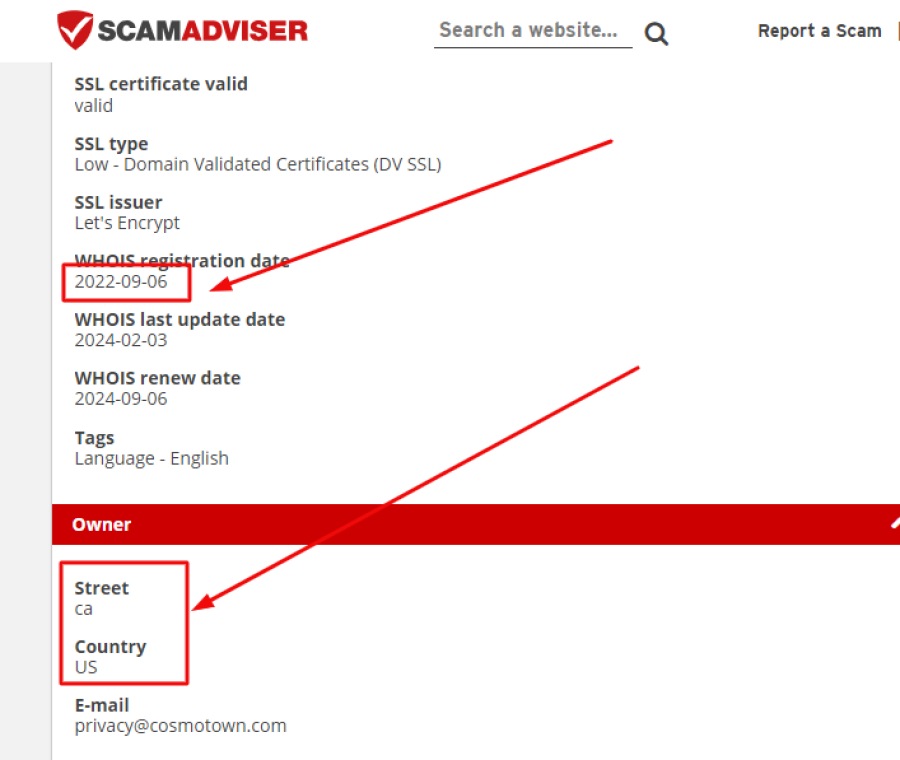Is Maxxfour.com Legit or a Scam?

Author: Adam Collins
Maxxfour.com is a website that offers lots of news, updates, and general information on the world of tech. It has consistently been among the most searched websites on Scamadviser.com. Hence, we are doing this review to give you, our readers, all the information necessary to make an informed decision. Let’s get started, shall we?
What is Maxxfour.com all about?
When I visited Maxxfour.com, I was bombarded with lots of tech-related articles. They seem to cover a wide range of topics from software to cyber security. They seem to offer a whole lot of information on tech news & updates as well as insights from various tech industries.

When Maxxfour.com Registered?
Based on the data gathered from Whois LookUp and ScamAdviser, Maxxfour.com was registered in September 2022. It appears that they opted for a two-year registration, with their renewal date scheduled for September 2024.

The website seems to have been registered in the United States, where, as per my online findings, the administrators are located.
Customer Feedback
There is no customer feedback available on popular review websites such as Trustpilot and ScamAdviser. This does not necessarily mean that Maxxfour.com is a scam. The fact that the website does not sell products means there are minimal interactions between the website and its visitors, especially monetary-wise.
Dummy Social Media Buttons
Interestingly, I found social media buttons on Maxxfour.com of popular social media platforms including Facebook, X(formerly Twitter), Instagram, and Pinterest. However, these were just buttons and only led to other pages within the website.

Why would a seemingly legitimate business incorporate dummy social media buttons? Upon searching for the same name on Facebook, no results were found. It's likely that they lack a social media presence and are merely including the buttons to create the illusion of an active website with an emerging social media following.
Bottom Line: Is Maxxfour.com a Scam?
In general, there is a high chance that Maxxfour.com may not be a scam. They seem to be offering tech-related information. The website was registered almost over 2 years ago and though there was no feedback, this is common with informative websites. I could not find any characteristics that overlap with what we see with scam websites.
However, it is still prudent to exercise caution and do your due diligence when interacting with Maxxfour.com.
This article has been written by a scam fighter volunteer. If you believe the article above contains inaccuracies or is missing relevant information, please contact ScamAdviser.com using this form.
Report a Scam!

Have you fallen for a hoax, bought a fake product? Report the site and warn others!
Scam Categories
Help & Info
Popular Stories
As the influence of the internet rises, so does the prevalence of online scams. There are fraudsters making all kinds of claims to trap victims online - from fake investment opportunities to online stores - and the internet allows them to operate from any part of the world with anonymity. The ability to spot online scams is an important skill to have as the virtual world is increasingly becoming a part of every facet of our lives. The below tips will help you identify the signs which can indicate that a website could be a scam. Common Sense: Too Good To Be True When looking for goods online, a great deal can be very enticing. A Gucci bag or a new iPhone for half the price? Who wouldn’t want to grab such a deal? Scammers know this too and try to take advantage of the fact. If an online deal looks too good to be true, think twice and double-check things. The easiest way to do this is to simply check out the same product at competing websites (that you trust). If the difference in prices is huge, it might be better to double-check the rest of the website. Check Out the Social Media Links Social media is a core part of ecommerce businesses these days and consumers often expect online shops to have a social media presence. Scammers know this and often insert logos of social media sites on their websites. Scratching beneath the surface often reveals this fu
So the worst has come to pass - you realise you parted with your money too fast, and the site you used was a scam - what now? Well first of all, don’t despair!! If you think you have been scammed, the first port of call when having an issue is to simply ask for a refund. This is the first and easiest step to determine whether you are dealing with a genuine company or scammers. Sadly, getting your money back from a scammer is not as simple as just asking. If you are indeed dealing with scammers, the procedure (and chance) of getting your money back varies depending on the payment method you used. PayPal Debit card/Credit card Bank transfer Wire transfer Google Pay Bitcoin PayPal If you used PayPal, you have a strong chance of getting your money back if you were scammed. On their website, you can file a dispute within 180 calendar days of your purchase. Conditions to file a dispute: The simplest situation is that you ordered from an online store and it has not arrived. In this case this is what PayPal states: "If your order never shows up and the seller can't provide proof of shipment or delivery, you'll get a full refund. It's that simple." The scammer has sent you a completely different item. For example, you ordered a PlayStation 4, but instead received only a Playstation controller. The condition of the item was misrepresented on the product page. This could be the